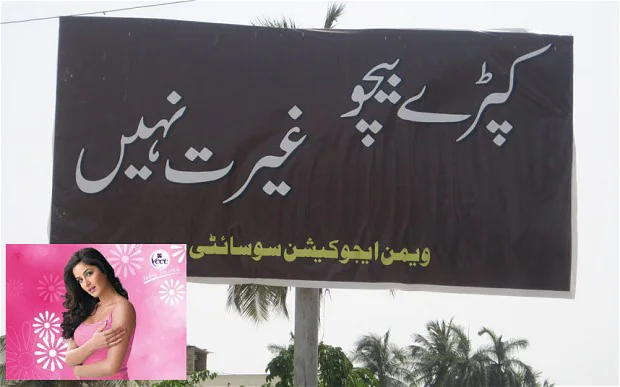BACK ON TRACK
"This feature article was originally published in TNS (The News On Sunday) on Dec 2007"
By Asad Jan
If you had a chance of visiting Peshawar, the capital of the North West Frontier Province (NWFP), during the rule of the Muttahida Majlis-e-Amal (MMA) from 2003-2007, you will definitely recall the s mashed or blackened billboards and hoardings bearing images of women models. If you think that The MMA, an alliance of six religious political parties, swept the 2002 elections and formed government in the NWFP. The party was also able to form a coalition government in Balochistan. However, the party's assent to power was greeted only with criticism, both at national and international levels, because of its own brand of Islam.the same situation still prevails, you are completely mistaken -- the Peshawarites are fast reverting to their true colours and the city's transition has started in the post-MMA period -- quite similar to the neighbouring Afghans, who abruptly abandoned what they had been forced to adopt by the Taliban The MMA emerged victorious in the last general elections, invariably due to its support for the Taliban. Following in the terrorist group's footsteps, it stopped the City's boutiques from showcasing mannequins. Also at the receiving end was the already dwindling film industry. Cinema houses faced several restrictions, such as the one refraining them from displaying promotional film banners and posters. To please their bosses, the official concerned swung into action against what they termed 'pornographic' billboards. The ban inflicted huge financial losses on the local cinema industry, as the cinema-goers stopped visiting them due to the lack of advertisements. This prompted film directors to demand lifting of ban on displaying of billboards. "Five years ago, when the MMA-led government smashed billboards, removed advertising banners and muffled musicians' voices, we lost about Rs 20 million in revenue per day," says Sharafat Ali Mubarak, former vice-president of the Sarhad Chamber of Commerce and Industries (SCCI). According to him, people have the right to express themselves freely and make decisions that suits their business interests. "If we want to compete with other countries, we should adopt the modern marketing techniques and provide opportunities to our musicians as they represent our culture," he stresses. In its attempt to enforce Shariah in the NWFP, the MMA also won some support because people thought it was on the right track to purge the province of vulgarity and safeguard the future generations from its ill-affects. However, they criticised the way MMA leaders, aided by charged workers, smashed costly advertisement posts. Drawing inspiration from the Taliban, the MMA government apparently made bolstering efforts to enforce Islam in every sphere of public life. Some of the party's ministers and leaders called for stern action according to the law against those responsible for smashing or blackening billboards, but simultaneously argued: "Though it was illegal, the act has won public's appreciation. Such billboards should not have been displayed in the first place, because advertising through women is unacceptable." Events unfolding under the MMA government in the NWFP also provided a food for thought to the media. In particular, the western media took great interest and started comparing the MMA to the Taliban. The MMA government also placed a ban on music and theatre performances in Nishtar Hall, which is Peshawar's only government-owned arts facility. It was declared as a no-go area and the 600-seat hall closed its doors to singers, dancers and musicians. Not only this, holding public concerts also became a sin in that era. This sparked off violent protests by the local folk singers, and television, film and stage artistes. The Peshawarites, who traditionally take a fancy to music, were in a lurch. The affected people, on their part, dubbed this as 'the Pakistani edition of Talibanisation'. A Pushto singer narrated to The News on Sunday on condition of anonymity how he was beaten black and blue before being thrown behind the bars for singing in public. "I cannot hold concerts. Music and poetry are a part of our culture, but the MMA government was too narrow-minded to appreciate this fact," he says. The ban on musical and cultural activities in the province paved the way for CDs and DVDs. "No one can stop the cultural growth of a society. If someone tries to stop it, it find another way of expression," prominent Pushto writer and poet Rokhan Yousafzai told TNS. Now that the days of the MMA government are over, businessmen have resorted to their normal routines -- one can see a marked difference, as eye-catching images of women can be seen on roadside billboards and hoardings. At the same time, showbiz activities have also gained steam in Nishtarabad's CD market. Of late, the ongoing violence in the province has caused a stir among those selling CDs. However, officially they are free to exhibit posters and banners aimed at attracting the intending buyers. The Artistes Welfare Association Zoom (AWAZ), an organisation of local film and television actors, was at the forefront in holding protests against the ban by the MMA government. "Many of our artistes lost their jobs and migrated either to Lahore or Karachi in a bid to earn their livelihoods," says AWAZ President Tariq Jamal. On a positive note, he informs that now the culture department has sent a summary to the caretaker provincial government for reopening Nishtar Hall. Forests face the threat of climate change the most.
